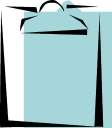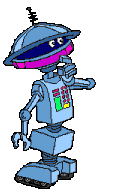 Focused
Task
Focused
Task
DESIGN
TASK ONE DESIGN TASK TWO
DESIGN TASK THREE PROPOSAL
RRR
Creating innovative
Multi-task vehicles for the 21st century
|
Rad
Robotic
Roadsters
|
The Players:
Design Supervisors of RRR: Ms
R and Ms HM
 Click on Apples for Teacher Tips
Click on Apples for Teacher Tips
Design Engineers: Students of
the Grade Four Class
Your classroom is the site of
the Rad Robotic Roadsters (RRR), an innovative car design company that
builds futuristic, multi-purpose vehicles. Unfortunately, sales have
been down, and the company is losing profits. The administration
of the company has hired a market research firm to do a study on what the
public wants in a new vehicle. They have surveyed a large portion of the
population and have come up with some interesting results.
Ms Robertson and Ms Hudson-McLean's
class has been hired as the new engineering design team. Their job is to
help create a successful new line of vehicles the public will buy, and
to save the financial fate of this company.
You are placed in a design team
with a couple of your friends, and you decide that being a design engineer
is going to be like a vacation from school. Just then, your Design
Supervisors reveal to you the report, and your vacation starts to look
like it won't be as relaxing as you thought!
This graph represents the findings
of the report:

The graph shows that the people
want: 
1. Vehicles that go fast.
2. Vehicles that do more than
just drive (the research teams are having trouble, so they are collaborating
as a group, brainstorming things that they can do.)
3. A car that thinks when it
touches something, and does not crash into things.
 DESIGN
TASK ONE
DESIGN
TASK ONE 
STEP
ONE: Design
Because the most important factor
in the report was car speed, this will be your first task.
You will create a prototype of
a moving vehicle consisting of:
-
An RCX box
-
Wheels and a structural system
to hold them on to the RCX
-
Motor and a system that drives
the vehicle
The structure must be strong and
reliable. That means it must hold together, and the design supervisor
(YOUR BOSS!!) must approve your design before you test it.
Reliability
and Products
The reliability
of a product is very important. Would you buy a car if it's wheels
fell off all the time? Would the consumers of RRR? Not a chance!
RRR's reputation depends on it's quality. |
 Time
to check in with your Design Supervisor!
Time
to check in with your Design Supervisor!
STEP
TWO: Testing 
Go to the Speed Testing Lab.
This high tech lab is used to determine the speeds of prototype vehicles.
Speed
Speed
is the measurement of distance divided by time. (s=d/ t). For example,
most cars on the highway are allowed to travel at 100km per hour.
That means in one hour the car will travel 100km. Your vehicle will be
traveling in meters, so your speed will be meters per second. |
 Click
here for copy of Prototype Worksheet 1
Click
here for copy of Prototype Worksheet 1
Your team will determine the
speed of your prototype by timing your vehicle traveling over the the pre-measured
distance (TWO METERS) in the speed testing lab, which will tell you the
speed.
1. You will place your vehicle
at the start line and have it run on program one, which will have your
car motor go forwards at maximum power.
2. You will time how long it
takes for it to reach the finish line.
3. You will calculate your speed.
Your speed will be the distance, 2 meters, divided by the time it took
(in seconds) to travel the distance (eg. 2 meters in 10 seconds; 2/10=0.2
meters per second).
ARE YOU DONE? Not a chance!
4. You will record the speed
of prototype one two more times, and record the average speed for your
files.
 Time
to check in with your Design Supervisor!
Time
to check in with your Design Supervisor!
| Why
is it important to test a measurement several times?
Many errors
can occur when taking measurements. For example, the reaction of
the timer and the placement of the vehicle. Can you think of any other
factors that could effect the reliability of the measurement? |
STEP
THREE: Redesign
Create a second prototype.
| For engineers
to design innovative and improved products they must use their problem
solving skills to find solutions to problems. Engineers test and
rebuild their prototypes many times, in order to achieve the best results.
Therefore… |
RRR has requested that their
design engineers create and test at least 3 to 5 prototypes, in order to
discover the fastest vehicle.
1. Your team will discuss a way
to improve the speed of your prototype. Use your knowledge of gears
and pulleys to help your modifications.
 2.
Once your group has agreed upon a modification, rebuild your prototype
and get it approved by your design supervisor.
2.
Once your group has agreed upon a modification, rebuild your prototype
and get it approved by your design supervisor.
3. Go to the speed testing lab
and conduct three speed trials and record your trial times in your
prototype chart.
STEP THREE:
Redesign and Test your prototype at
least one more time.
LAST STEP
of TASK ONE: You made it, congratulations!?
1. You need to analysis and represent
your data to decide which prototype you will use. To do so you must input
your information into a spreadsheet, and calculate the average speed for
each prototype. See Spreadsheet
Tutorial for more details.
2. Next, head management of RRR
will want to see a graph demonstrating your choice of prototype.
You will use the graphing function of Excel to make a clear and visually
pleasing graph. Print a copy for your Prototype design folder, and save
a copy of your spreadsheet and graph in your student file (you may need
it later).
 3. Check with your design supervisor before moving onto your next task.
Don’t get a speeding ticket!
3. Check with your design supervisor before moving onto your next task.
Don’t get a speeding ticket!
 DESIGN
TASK TWO (Restart Task)
DESIGN
TASK TWO (Restart Task)
STEP ONE: Designing
Cars that only drive….BORING! Or at least that is what
our survey told us our consumers think. You need to build a second function
that moves onto your fastest prototype.
 Click
here for Prototype Worksheet 2
Click
here for Prototype Worksheet 2
1. This is a time for you to get out the design board,
and brainstorm with your design team on what other functions your robot
will have. (How will you decide what it will do?)
Basic: Using a mini-motor to make something move.
Supreme: Using the turning force from the axles you
can make other things move. Bevel gears and spur gears can be used
to change the direction of the spinning. Click
here to find out more about how gears can work.
2. Experiment, build and make your vehicle as interesting
and funky as you like. You can use a mini-motor or try using the turning
force from the axles. You make also and lights and creative design
features to make your vehicle attractive.
 Check with your Design Supervisor before you move on to programming.
Check with your Design Supervisor before you move on to programming.
STEP TWO: Programming
By programming your vehicle to behave how you wish,
you will create a ROBOT. A Robot is a machine that is programmed.
A robot can only do what its’ programmer tells it to do. This is your chance
to teach your vehicle what you want it to do. Click
here for programming help.
3. Program your robot to behave how you like.
You can add beeps, music, and various motions.
Reminder: The RRR survey showed that consumers
wanted interesting and creative robotic vehicles.
 Please
show your Design Supervisor how your program works!
Please
show your Design Supervisor how your program works!
 DESIGN
TASK THREE (Restart Task)
DESIGN
TASK THREE (Restart Task)
Safety was the third item on the survey conducted by
RRR. The consumers are sick and tired of their fast cars smashing into
things, it spoils their fun! So can you help them out?
 Click
here for Prototype Worksheet 3
Click
here for Prototype Worksheet 3
1. Find a way, using a sensor, to prevent your fast,
cool robotic vehicle from crashing into things. It must somehow know that
it is going to crash into something, and stop itself.
| A touch sensor
will tell your robot that it is bumping into something. It has a little
yellow button on it, and when it’s pushed it will tell the RCX box. You
can program it to go backwards, stop and/or beep when it is pushed. |
| A light sensor will determine
when it is getting close to a wall. It will get less light and react, and
you can program it to do the same things as a touch sensor. |
2. As any good engineer does, it is a good time to
test your program. Make sure there are no programming bugs! Once you have
a cool program, check out the next step.
 3.
Time to check in with your design supervisor!
3.
Time to check in with your design supervisor!
4. Print and save a copy of your program. Put the copy
in your folder.
5. Take a picture of your robotic vehicle with the
digital camera. Print a copy for your prototype folder, and save it into
your file.
You are now ready to create your proposal for RRR!!
 PROPOSAL
for RRR (Restart Task)
PROPOSAL
for RRR (Restart Task)
The administration of RRR is in Toronto and therefore
you will need to send your proposal for the new vehicle via the internet.
They will want to know how you created your vehicle.
Name of Vehicle Prototype:
Reason RRR should choose it:
Special Features:
1. They want to see the results of the speed tests
from the driving mechanisms of your vehicle. Please include what type of
drive system worked best and why (eg. gears or pulleys - and graphs are
a great way to show your data).
2. They want to know what interesting things that
your vehicle can do. Please include a copy of your sketch, or some of your
brainstorming ideas. Then describe why you chose the features that you
did. RRR wants to know what was most frustrating, and how you solved the
frustration.
3. RRR has tried for years to find a car that would
not crash. Was yours successful? Also, include a copy of your program,
so they can understand what it can do. They would like to see the brains
behind all of this work, so please include a picture of your design team
with your robot.
| A proposal is like a commercial,
it is to sell your product. Would you like to buy a toy that seemed boring?
No! So when you make your proposal, be creative! Make it cool, unusual
and interesting with neat colours, fonts, pictures and a creative layout.
But remember, as a design team, you must be professional. Make sure you
have good spelling, and that it makes sense. |




 Restart
Task
Restart
Task